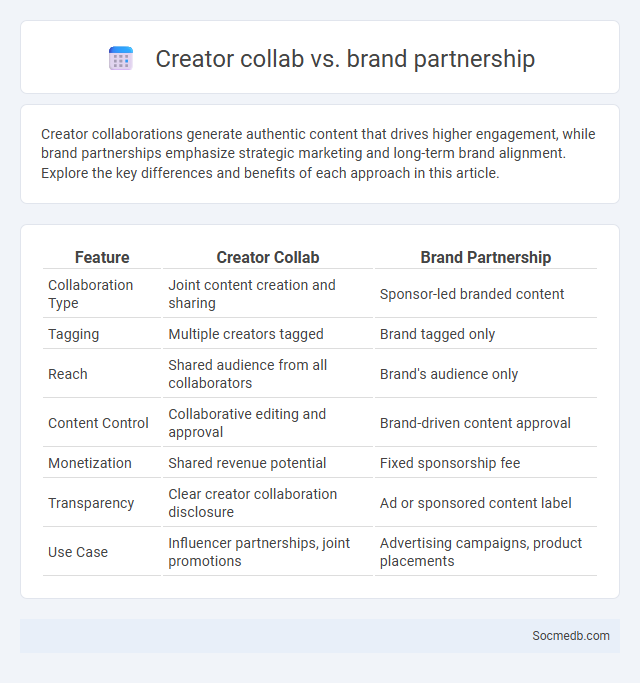
Photo illustration: Creator collab vs brand partnership
Creator collaborations generate authentic content that drives higher engagement, while brand partnerships emphasize strategic marketing and long-term brand alignment. Explore the key differences and benefits of each approach in this article.
Table of Comparison
| Feature | Creator Collab | Brand Partnership |
|---|---|---|
| Collaboration Type | Joint content creation and sharing | Sponsor-led branded content |
| Tagging | Multiple creators tagged | Brand tagged only |
| Reach | Shared audience from all collaborators | Brand's audience only |
| Content Control | Collaborative editing and approval | Brand-driven content approval |
| Monetization | Shared revenue potential | Fixed sponsorship fee |
| Transparency | Clear creator collaboration disclosure | Ad or sponsored content label |
| Use Case | Influencer partnerships, joint promotions | Advertising campaigns, product placements |
Understanding Creator Collaborations
Creator collaborations on social media amplify content reach by combining diverse audiences and expertise, enhancing engagement metrics significantly. Platforms like Instagram, TikTok, and YouTube provide built-in tools for joint content creation, enabling seamless cross-promotion and authenticity in branded partnerships. Understanding these collaborations involves analyzing audience demographics, engagement rates, and content synergy to optimize marketing ROI effectively.
Defining Brand Partnerships
Brand partnerships on social media involve collaborations between businesses or influencers to enhance brand visibility and reach targeted audiences effectively. These partnerships leverage mutual strengths, combining content creation and marketing strategies to drive engagement and increase brand loyalty. Successful brand partnerships are data-driven, focusing on audience alignment, consistent messaging, and measurable outcomes to maximize return on investment.
Key Differences Between Creator Collabs and Brand Partnerships
Creator collabs involve influencers or content creators working together to produce authentic, relatable content that resonates with their audiences, while brand partnerships are formal agreements where brands leverage creators to promote specific products or campaigns. Your choice depends on the level of creative control and long-term relationship you seek, with collabs often emphasizing creative freedom and partnerships focusing on strategic marketing goals. Understanding these key differences helps optimize your social media strategy for engagement and brand loyalty.
Pros and Cons of Creator Collaborations
Creator collaborations on social media amplify your reach by combining diverse audiences and content styles, boosting engagement and creative innovation. However, challenges include potential brand mismatches, differing work ethics, and the complexity of profit-sharing agreements that can lead to conflicts. Evaluating compatibility and clear communication ensures collaborations enhance your social media growth effectively.
Advantages and Drawbacks of Brand Partnerships
Brand partnerships on social media enhance brand visibility and enable access to diverse consumer audiences through influencer collaborations, driving higher engagement and credibility. Leveraging combined resources and creative content often results in increased brand trust and sales conversions. However, misaligned values or inconsistent messaging between partners can harm brand reputation and confuse target audiences, while dependency on partners may reduce control over brand narratives.
Goals and Objectives: Creator vs Brand Approaches
Creators prioritize building authentic connections and fostering community engagement by sharing personal stories and unique content to grow a loyal audience. Brands focus on increasing market reach and driving conversions through targeted campaigns, consistent messaging, and data-driven strategies. Both approaches aim to maximize visibility and influence, but creators emphasize relationship-building while brands target measurable business outcomes.
Influencer Marketing: Where Do Collaborations and Partnerships Fit?
Influencer marketing plays a crucial role in social media strategies by leveraging trusted voices to amplify brand messages and drive engagement. Collaborations and partnerships with influencers enhance authenticity, expand reach, and foster deeper audience connections, making campaigns more impactful. By choosing the right influencers aligned with your brand values, you optimize your social media presence and maximize return on investment.
Authenticity and Audience Trust in Each Model
Social media platforms thrive when authenticity is prioritized, fostering genuine connections that enhance audience trust and engagement. Influencers and brands that consistently share transparent, relatable content build stronger loyalty compared to curated or overly polished posts. Trust metrics, such as consistent interaction rates and positive sentiment analysis, serve as key indicators of authenticity's impact on audience retention and growth.
Measuring Success: Collab Metrics vs Partnership KPIs
Measuring success in social media collaborations involves analyzing both collab metrics such as engagement rate, reach, and content shares, and partnership KPIs including brand awareness growth, customer acquisition costs, and return on investment (ROI). Collab metrics provide immediate insights into audience interaction and content performance, while partnership KPIs assess long-term strategic value and business impact. Balancing these data points optimizes campaign effectiveness and strengthens influencer-brand relationships.
Choosing the Right Strategy for Your Brand
Selecting the right social media strategy for your brand requires understanding your target audience's preferences, behaviors, and platform usage patterns. Tailoring content types--such as videos, images, or stories--based on engagement metrics on platforms like Instagram, TikTok, or LinkedIn maximizes reach and conversions. Consistently monitoring analytics and adapting campaigns ensures alignment with evolving trends and brand objectives for sustained growth.
 socmedb.com
socmedb.com